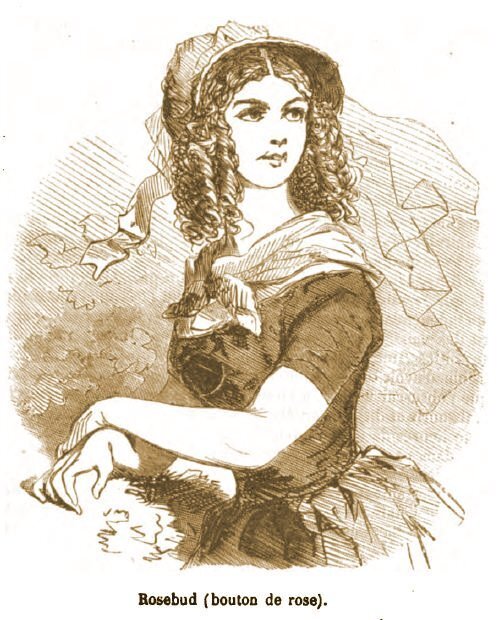CHARACTER INSIGHTS
This drawing of a girl titled Rosebud (bouton de rose) has been floating around the internet and was brought to my attention by Albert Benhamou on his website http://www.lautresaintehelene.com/other-st-helena-index.html The costume seems to be contemporary and the hands are on show –Charlotte Knipe was known for her beautiful hands. Also the caption is in English and French which may mean something. If anyone knows anything about this sketch or has knowledge of other Rosebud pictures please let me know.
Comtesse Albine de Montholon, a member of Napoleon’s entourage, who writes in her St Helena memoirs: Souvenirs de Sainte-Helene:
“The daughter of the house introduced us to one of her friends, Miss Kneips, the prettiest person we could see: tall, blonde, handsome waist, fair complexion. Her freshness, her beauty, made us call her Rosebud and we never called her anything else. Her mother was the widow of an officer of the company and lived there from some modest pension.”
William Balcombe, Napoleon’s provisioner and father of the bratty Betsy.
Gaspard Gourgaud, (born Nov. 4, 1783, Versailles, Fr.—died July 25, 1852, Paris), French soldier and historian who accompanied Napoleon Bonaparte into exile at St. Helena and wrote important historical and biographical works about Napoleon.
Gourgaud rose through the ranks of the French imperial army, was wounded a number of times, and apparently saved Napoleon from a pistol wound at the Battle of Brienne (January 1814). After a brief flirtation with royalist forces following Napoleon’s abdication in 1814, he rejoined the emperor during his “Hundred Days” and then voluntarily accompanied him into exile at St. Helena. Gourgaud’s two-volume Sainte-Hélène; Journal inédit de 1815 à 1818 (1899; The St. Helena Journal of General Baron Gourgaud) remains one of the basic accounts of Napoleon’s last years.
Gourgaud returned to France in 1821, reentered the army, and continued to rise in rank. He wrote a number of valuable historical works, including Campagne de dix-huit cent quinze (1818; “The Campaign of 1815”), Napoléon et la grande armée en Russie (1824; Napoleon and the Grand Army in Russia), and Réfutation de la vie de Napoléon par Sir Walter Scott (1827; “Refutation of Sir Walter Scott’s Life of Napoleon”). In 1849 Gourgaud, by then a baron and a peer of France, was elected to the Legislative Assembly, where he became an influential supporter of Louis-Napoléon (later Napoleon III).
In his Saint Helena Journal entry for January 8 1816 Gaspard writes:
"Mr. Porteous brings Rosebud to lunch. Madame Montholon, who believes Rosebud to be His Majesty's mistress, flatters her intensely, takes her arm. The emperor goes into the garden, meets them, talks to Mr. Porteous, and declares that Madame Walewska [Napoleon's Polish mistress] is much more beautiful than Rosebud. He orders me to harness the horses to take the ladies back, [where?] and I am to accompany them. On the ladies' return, His Majesty salutes them, and we observe that Madam Montholon is no longer the same to Rosebud, since she sees that His Majesty doesn't find her so beautiful after all!"
What to make of this? The main point Gaspard is attempting to make is that Madame Montholon is a shameless sycophant who will do anything she can to ingratiate herself with Napoleon.
Was Rosebud present when Napoleon made the unflattering comments about her to Porteous? Madame Montholon presumably was present unless Porteous relayed the comments to her which seems unlikely. What is certain is that this diary entry is further evidence of the feuding and back stabbing that went on among members of Napoleon's entourage. As far as Rosebud was concerned even if she was present when Napoleon was downgrading her beauty, it might have been flattering to her, a poor Yamstock, to be compared with a beautiful Polish countess.
My guess is that she was present and that this is another example of Napoleon's addiction to a kind of aggressive teasing that came very close to bullying.



